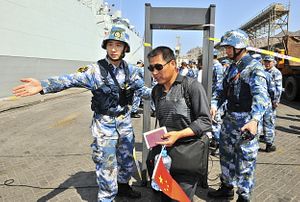Despite Chinese Foreign Minister Hong Lei’s unequivocal denial of Myanmar’s assertions of Chinese involvement in the Kokang conflict, the notion of tacit Chinese support may bring up broader questions for observers and leaders alike. Some under the SCO umbrella may be asking, when it comes to protecting its citizens, will China truly respect the principles of sovereignty and non-intervention? Will possible future action against Chinese migrants in our sovereign territory face active opposition by the Chinese government?
The “New Silk Road” concept – which has taken over Chinese foreign policy of late – is dependent on these non-interventionist principles to maintain stability in Beijing’s lucrative relationships, particularly in Central Asia. After a Jordanian pilot was notoriously executed by ISIS, many in China wondered what the government would do if a Chinese citizen were in a similar situation. How would Beijing’s decision-making proceed should the leadership have to choose between its citizens’ safety and its political and strategic interests?
The Kokang conflict itself constitutes a suggestive example: As refugees poured into China, it became clear that the government had detailed, extensive plans for distributing aid and managing security concerns. The response demonstrated China’s “resolve to protect its territorial integrity and regional security interests and indicated how China might respond to contingencies elsewhere,” wrote Drew Thompson of The Nixon Center in Washington, D.C. This resolve was also reflected after the accidental bombing of Chinese territory, when the PLAAF ordered air patrols and radar surveillance to protect Chinese airspace.
These contingency plans, which included the setting up of temporary refugee camps, reveal the ongoing internal debate over whether Deng Xiaoping’s notion of “biding one’s time and hiding one’s capabilities” is still appropriate for China and imply that China won’t hesitate to act when its core interests are threatened. So, are Chinese citizens considered to be “core interests”? What, if any, is China’s contingency plan for trouble elsewhere, including in Central Asia? As nationalism rises and technology makes the government more accountable to the people, the balance of interest may begin to shift.
In early April, two Chinese naval vessels evacuated 225 citizens from 10 countries, along with approximately 500 Chinese citizens, during a mission in Yemen. The frigates were “in the right place at the right time,” an anonymous source reported, and so several governments including Pakistan, Germany, Ireland, Singapore, and the U.K. requested Chinese assistance evacuating their citizens. The operations, during which PLA Navy personnel bore significant risk, were the first time China rescued foreign nationals under such conditions.
The Yemen case is a rare example not only of China’s willingness to deploy troops and rescue both Chinese and foreign nationals, but also of the extensive preemptive planning that diplomats and the PLAN put into the operation. It provides useful information as to how a rescue might be planned and executed, but still does not give observers any insight into how leadership’s decision-making might proceed in a situation where they must choose between conflicting interests, or where the government in question retains sovereignty and does not sanction intervention. In Yemen, there was no trade-off or downside to intervention as China had the Hadi government’s approval and possesses no other strategically essential interests in Yemen. The same applies to China’s other evacuation ops, such as those from Libya by sea and Cairo by air, both in 2011.
Lyle Goldstein of the U.S. Naval War College aptly summarizes the relationship of the Yemen case to this article’s central questions, saying “It has become very common for Chinese to demand that Chinese nationals be protected abroad more forcefully by the government. Thus, in the Yemen case, two frigates can easily be dispatched to ‘show the flag,’ but without incurring major risks or somehow pushing the operational envelope.” That’s not to say the PLAN didn’t do an excellent job coordinating with international partners and formulating a solid plan well in advance, but Beijing had little to lose by intervening in Yemen.
Unfortunately, there is no simple answer to the question of how China might handle such threats. The available examples do not provide answers so much as they help us ask the right questions, and also clarify both what variables should be monitored (such as nationalism) and what Chinese intervention may look like upon implementation. As yet, China has not had to make a choice between its economic and political interests and the safety of its citizens. But as China plays a greater role in regional and international politics, the likelihood that the government will be faced with this choice in the future increases, and speculation over China’s involvement in Myanmar does not help soothe neighbors’ uncertainty.
How the Party, the military, and the people will react remains to be seen.
Benjamin Shook is a former intern of the Royal United Services Institute in London and the U.S. Senate in Washington, D.C, and is currently based in Hong Kong.

































